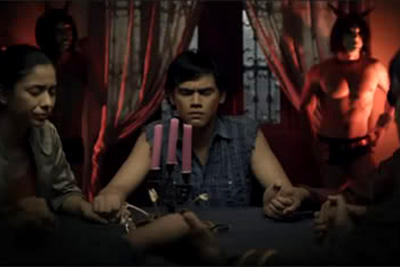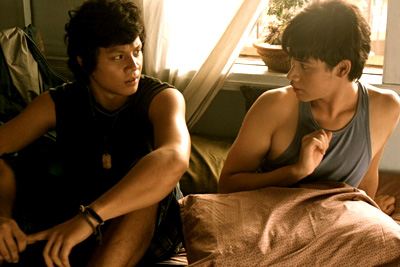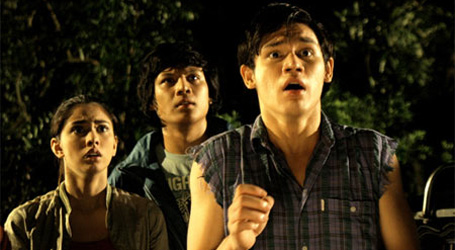Back in 2009, screenwriter Raymond Lee was vacationing in the mountain town of Lucban when a five year-old boy yelled an insult at him: “Bakla!” For those of you who don’t speak Tagalog, bakla is a word that means a gay man, effeminate man or transgender woman. It’s not necessarily negative – it can actually be used as a term of endearment. Still, Lee was shocked by the boy’s viciousness – especially disturbing, given that the town is well-known for being gay-friendly.
By nighttime, however, his shock had turned to inspiration. Lee proposed to his friends an idea for a new movie: a kid goes around calling people bakla until one day a transwoman places a curse on him – when he grows up, he too will become a bakla!
Thus, Zombadings 1: Patayin sa Shokot si Remington (“Remington and the Curse of the Zombadings”) was born. (“Zombadings” is a combination of the words zombie and bading, a more colloquial term for gay men.) It’s a hilarious gay movie, and not just because it features the cross-dressing undead. The whole film is jam-packed with wacky characters: kickass policewomen, a roller-blading widow, muscle mary evil spirits and a butch female mayor.
There are two main plots. First, there’s the tale of our protagonist Remington, played by 21-year-old matinee idol Martin Escudero. This is Mart’s first lead role: he’s been in plenty of soap operas and movies as a best friend or boyfriend, so it’s been a surprise for everyone to discover that he’s a true comedic talent. He’s getting nominated for awards left right and centre for his portrayal of a macho straight guy gradually transforming into a flamboyant gay kid.
The second plot is even more bizarre: it’s about a serial killer who’s hunting down the town’s gay men and transwomen and murdering them with an electronic gaydar. Needless to say, when the two plots collide, all hell breaks loose.
The show debuted in the Philippines on 31 August 2011 under the title Zombadings 1: Patayin sa Shokot si Remington. It had its doubters initially – when the filmmakers approached Star Cinema to distribute it, they were told, “Congratulations, you’ve made a movie with no market.” Of course, the film turned out to be a sleeper hit in Metro Manila, grossing 37 million pesos (US$800,000 or S$1 million), and all investors were paid back in full by 1 December. (Sadly, in the rest of the country it had limited screenings – Lee claims that Star Cinema strategically blocked it in regional theatres by releasing their own new movies early.)
Last Friday and Saturday, the first international screening was held in Singapore as part of the Singapore Art Museum’s Southeast Asian Film Festival. The film’s also been invited to the Hong Kong, Seattle and San Francisco Film Festivals in the near future. We might even see a release in commercial cinemas in Singapore – after all, this happened with another gay movie the filmmakers worked on, The Blossoming of Maximo Oliveros.
I managed to catch director Jade Castro and screenwriter Raymond after the Singapore screening. Co-screenwriter Michiko Yamamoto was unfortunately absent: all three are key members of the company Origin8 Media, which produced and distributed the film.
Jade was boyishly handsome with a strong, rake-thin features, while Raymond looked glamorous in his flowing black dress and lipstick. They had plenty to share about the story of the film’s success – and its political incorrectness.
æ: Age, sex, occupation, location?

Jade: 33, male, filmmaker / writer, Philippines, originally from the province of Cavite, now living in Pasig City, Metro Manila.
Raymond: 40, transwoman, screenwriter and film producer, Metro Manila.
æ: How did you get started in the film business?
Raymond: Through friends from college. We were members of Cineastes Studio, the University of the Philippines student org for film buffs. They told me about a job opening in a new movie studio called Star Cinema. I was hired as a regular brainstormer of movie concepts and eventually trained to become a screenwriter.
Jade: I majored in Film at the University of the Philippines. While still in school, I wrote for Pelikula (a magazine on Philippine cinema, now defunct). I did all sorts of film-related work right after school, but most significantly as a brainstormer for TV for a year, then they moved me to the movie department, at Star Cinema, where I soon started writing screenplays commissioned by them.
æ: What other movies have you made that you are particularly proud of?
Jade: I'm still insanely proud of my first directorial full length, Endo, because it's very personal, and it's probably the movie that got people to look at me as a director and not just, you know, some kid, haha.
æ: How did you guys get the idea for Zombadings?
Raymond: It’s based on a true incident involving myself. Jade and I and another friend were vacationing in Lucban, a very small, quiet town south of Manila. I was alone, taking a walk, and there was a boy about 5 or 6 years old who passed ahead of me and said, “Bakla!” And the way he said bakla – it had a tinge of hate. He must have picked it up from an older person. And when that happened to me, I was a bit taken aback. The kid was so young, and the kind of hate he had – and Lucban is known for being a place that’s very gay-friendly.
So I came up with the idea for a movie: a boy who calls everyone bakla, and that one day he meets his match and is cursed to be gay. That refers to the fact that some people still think being gay is a choice.
æ: You’ve won a number of awards for it already, haven’t you?
Raymond: Martin Escudero has been nominated for Best Actor by several local award-giving bodies. He just won the Gawad Tanglaw Best Actor prize. The other awards are still to be announced. Kerbie Zamora, who played Remington's best friend Jigs, won Best Supporting Actor also at Gawad Tanglaw.
Jade: To add to what Raymond said, Gawad Tanglaw (an educators’ award) also named us Second Best Picture of the year. Okay, maybe that's not a win. Also the Golden Screen Awards (a press award) nominated Martin Escudero for Best Actor but didn't win.
æ: Could you tell us a bit about your cinematic references?
Jade: We did refer to a lot of old Pinoy comedies. Petrang Kabayo at ang Pilyang Kuting (Rough English translation: Petra the Horse and the Naughty Kitten) from 1988 is the major reference. Not only in plot – a baby was cursed to become a horse when he grows up (he's gay) – but also in its somewhat shambolic form, which was common in Filipino comedies of that era, especially enjoyable in the films of Luciano Carlos who directed Petrang Kabayo. I'm still grateful we were able to cast Roderick Paulate as the source of the curse. He played the original Petrang Kabayo. (The movie was later remade starring a different actor.) Casting him makes the "reference" complete.
Obviously there are a lot of horror elements derived from all sorts of places. And also partly a mashup of the gay genre, which means we put in a lot of elements, clichés and conventions from gay movies. Like macho dancers: there are a lot of movies about macho dancers, so we put them in the séance scene. When you show it to a Filipino audience, they just have an instant reaction to it. They know what it alludes to.

æ: Are there a lot of Filipino gay movies?
Jade: I’ll put it in context. Almost every week there’s s a gay film that comes out in the Philippines! Last year the highest grossing film in the Philippines was a gay film, Praybet Benjamin. But a lot of what comes out is like Brokeback Mountain kind of stories. There are fewer depictions of transgender people. It seems as if the movie as taken as a whole want to reinforce the idea that gay men are just like real men too, the masculine type of gay men. That’s the ideal of a gay man.
And so Zombadings is a reaction to that. Why not zombies? They could be zombies and gay, and what’s wrong with that? Do you really have to be masculine, good-looking upstanding citizens who fall in love with only one person and have to subscribe to the traditional ideas about family? So we kind of knew we were making a politically incorrect movie and we might offend some sensibilities. But we felt that it was important to make people confront these things.
æ: What has the overall audience reaction like?
Jade: Mostly fantastic. Some hated it, but that's also fantastic, hehe.
æ: How so?
Jade: Right after the first screening an article came out from a guy named Michael David Tan. He did say it was anti-gay, because we were talking about Remington turning into a stereotype of a swishy gay person, among other things. He also found a premise of a curse to be objectionable. He complained that the movie was saying that homosexuality is a curse. And he hated the title. He thought that the title was dangerous because to him it was like name-calling.
Raymond: But we find that most of the gay community didn’t agree with him. In fact there’s a national organisation of gays in the Philippines called Ladlad. It’s become a political party of LGBT nationals. They approved of the film and they invited me to speak at their anniversary. And some of the leaders of Ladlad were saying that the author of the hate letter against us lacked a sense of humour. And there was a smaller group, a Crusade against LGBT hate crimes in the Philippines, and they saw the movie and they liked it because it was funny, but at the same time they said, “You weren’t making fun of hate crimes.”
Jade: You see, there’s very little depiction of violence against the gay community, and this could contribute to the awareness of it. What they did was they teamed up with us and in some of our early previews and advance screenings, they would come with us and distribute flyers with information about hate crimes, facts like how it’s rapidly increasing, which is largely unreported in the media.

21-year-old matinee idol Martin Escudero (right) plays Remington
with Kerbie Zamora, who plays his best friend
æ: So this is in a way an activist film?
Jade: We were being kind of sneaky. We got people to laugh at the film and enjoy the film and get interested, but not pushing the issues into their face. But at the end of it you do want to have a discussion about it. The use of stereotypes makes it familiar to most people who are not familiar with the issues of the community. But the end of it, you show them a little bit more, and you open a world of questions and topics that they would otherwise not think of as important.
That’s why we have a lot of straight fans. And women. Women seem to particularly love it – the language too! I sometimes see them walking out of the theatre and mimicking the chant [from the séance scene]. We love the film so much so when it was running in the cinemas sometimes we’d go to see for ourselves what was going on, and we’d overhear people shuffling out of the theatre still laughing, still having a good time. And they were trying to mimic the chant.
Raymond: Even in offices and schools, straight guys would try to say “award”, a a gay coinage from the ‘70s. It used to mean something negative. For example: “Award! Her husband caught her with her lover!” or “Award, our gay friend got beat up.” But recently it can mean to praise something amazing.
Jade: People like David Michael Tan complain that the use of gayspeak is a stereotype, and it’s true that not all gay men speak that way. But you could see that after the movie people who are not gay are trying to mimic the gayspeak in a happy, positive manner. And in that respect I felt we succeeded in our depiction of gay speech as a celebration of identity. Because a lot of the film is about that: celebrating what is different instead of trying to force yourself into traditional prefabricated notions of self.
æ: What are your favourite movies?
Jade: We have a lot of favourites!
Raymond: I watch everything, international films and local films and Hollywood films. I don’t really. I’m not a fan of any particular genre or nationality, I’m a whore when it comes to watching movies.
Jade: Me too, I’m a slut. But in terms of gay films, Poison, Beautiful Thing, Hedwig and the Angry Inch in that order. (to Raymond) Your favourite, you told me, was Beautiful Laundrette.
Raymond: I’ve been a cinephile from a very young age. And that was the ‘80s, and I was a kid, and I wasn’t out yet. And I really wanted to watch it, and I could only get a Betamax. And I forced my family to watch it with me. I didn’t know the protagonists would be kissing, and not just kissing. The whole family went silent.
Jade: As for Asian gay movies, Happy Together still holds a special spot in my heart. A student publication recently asked me for my recommended must-watch and my first response was Pink Flamingos. But my favourite movie ever, if forced to choose one, is Gattaca. Go figure.
æ: What are your next projects?
Jade: My new movie My Kontrabida Girl just opened in Philippine theatres. Raymond and I and the rest of our company Origin8 Media are cooking up our next one.
æ: Besides the Hong Kong, Seattle and San Francisco Film Festivals, where else might we see Zombadings?
Raymond: We’re still trying to sell the distribution rights. That’s why there is no DVD release with English subtitles yet. And a writer called us and said they want to remake it for the US. But it makes sense! Because in the US the issue of bullying gays and lesbians and transgender people is so much an issue. I’m sure you’ve heard or read to the point that some teenagers take their own lives. In that sense, discrimination against gay people in the US is worse in the Philippines.
And we got such a warm, positive feedback from our Singapore Art Museum screenings that we're planning to bring Zombadings back to Singapore, and hopefully screen it at a cinema in a regular run. We hope you'll be interested enough in our movie to keep an eye out for it. Or why not, maybe even call up your favourite cinema and ask them if there's a chance they might show our film.
For more information about Remington and the Curse of the Zombadings, go to its website, www.zombadings.com or its Facebook page, www.facebook.com/remingtonthemovie.

